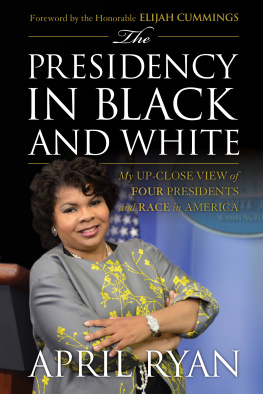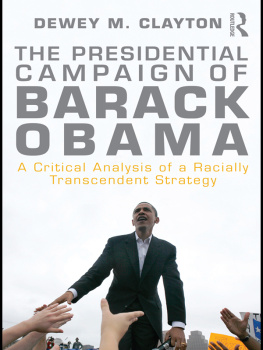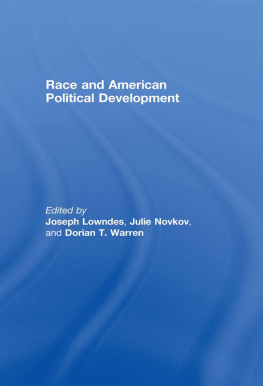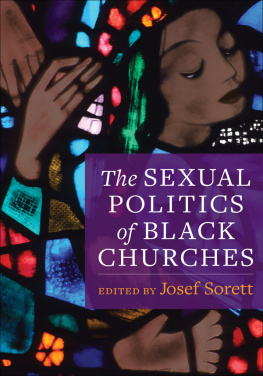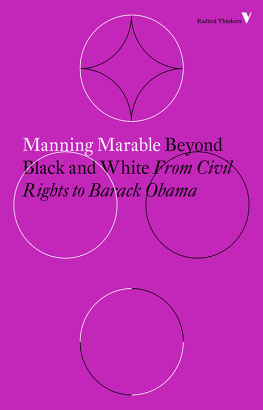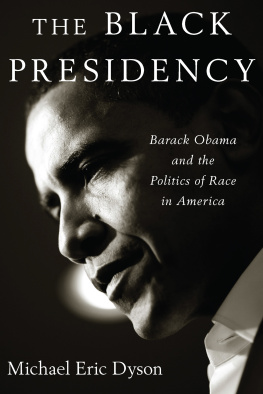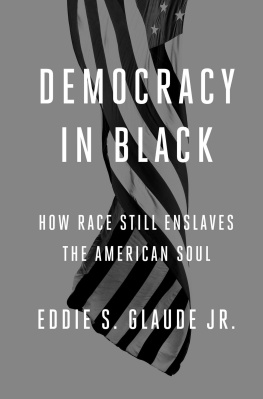Kenneth W. Mack is the author of Representing the Race: The Creation of the Civil Rights Lawyer. He is a professor at Harvard Law School and lives in Newtown, Massachusetts. Guy-Uriel Charles is a law professor and the founding director of the Duke Center on Law, Race, and Politics. He lives in Durham, North Carolina.
BY KENNETH W. MACK
Representing the Race: The Creation of the Civil Rights Lawyer
EDITED BY GUY-URIEL E. CHARLES
Race, Reform, and Regulation of the Electoral Process:
Recurring Puzzles in American Democracy
(with Heather K. Gerken and Michael S. Kang)
THE NEW BLACK
What Has Changed
and What Has Not
with Race in America
Edited by
Kenneth W. Mack
and Guy-Uriel E. Charles

NEW YORK
LONDON
2013 by Kenneth W. Mack and Guy-Uriel E. Charles
All rights reserved.
No part of this book may be reproduced, in any form, without written permission from the publisher.
Immigration and the Civil Rights Agenda by Cristina M. Rodrguez originally appeared in the Stanford Journal of Civil Rights & Civil Liberties 6:1 (2010): 12344. The Right Kind of Family: Silences in a Civil Rights Narrative by Jonathan Scott Holloway is adapted from .
Requests for permission to reproduce selections from this book should be mailed to: Permissions Department, The New Press, 38 Greene Street, New York, NY 10013.
Published in the United States by The New Press, New York, 2013 Distributed by Perseus Distribution
ISBN 978-1-59558-799-2 (e-book)
CIP data available
The New Press publishes books that promote and enrich public discussion and understanding of the issues vital to our democracy and to a more equitable world. These books are made possible by the enthusiasm of our readers; the support of a committed group of donors, large and small; the collaboration of our many partners in the independent media and the not-for-profit sector; booksellers, who often hand-sell New Press books; librarians; and above all by our authors.
www.thenewpress.com
Composition by dix! Digital Prepress
This book was set in Minion
10 9 8 7 6 5 4 3 2 1
To the memory and legacy of Dr. John Hope Franklin
mentor, role model, and friend.
May your work and lifes example continue to inspire and awe.
CONTENTS
Orlando Patterson
Kenneth W. Mack and Guy-Uriel E. Charles
Lani Guinier and Gerald Torres
Taeku Lee
Cristina M. Rodrguez
Paul Butler
Luis Fuentes-Rohwer
Jonathan Scott Holloway
Orlando Patterson
Jeannine Bell
Angela Onwuachi-Willig
Glenn C. Loury
Elizabeth Alexander
Orlando Patterson
In coming to terms with what has changedand what has notwith race in America at the beginning of the twenty-first century, one must first grapple with a deep paradox that lies at the heart of black-white relations today. The relationship between African Americans and Euro-Americans is at the heart of the race problem in the United States, although of course there are many other racial and ethnic groups now struggling to find their place in an increasingly diverse society. On the one hand, African Americans have been wholly accepted into the public sphere of American life, which is the greatest achievement of the civil rights movement. On the other handdespite undeniable breakthroughs, most evidently the election of an African American as president of the United Statesthey still remain largely excluded from the private lives and private sphere of Euro-American society.
In less than a generation, the legal and political infrastructure that defined American race relations for most of the twentieth century has been dismantled. The civil rights and voting rights acts of the 1960s opened the way not only for black individuals to receive basic respect from their fellow citizens, but also for their full participation in the nations public life. Black Americans are an essential component of the Democratic Party, and they have run for and been elected to offices at all levels, all over the country, from mayor to senator to governor. President Obamas election was simply the fitting culmination of this great process of political inclusion.
A striking example of the integration of blacks into the nations public life is the transformation of the militarythe repository of the nations honor and power. Traditionally, blacks were excluded from all but the lowliest functions in the American armed forces. That exclusion had its roots, in part, in the historic influence of white southerners in all branches of the armed forces. White southerners were traditionally steeped in a code of militant honor that had its basis in the degradation of blacks under slavery and later Jim Crow, as the late historian John Hope Franklin has argued. Hence the need to exclude blacks from military honor as part of the racist system of humiliating them and defining them as permanent outsiders. The integration of the armed forces, beginning with the administration of President Harry Truman, worked a veritable revolution in one of the most conservative institutions in America. The subsequent rise of blacks at all levels in the military, now including over 10 percent of the armys officer corps, and Colin Powells appointment as the nations highest-ranking military officer are achievements almost on a par with Obamas election.
The rise of a black middle class is another great advance that any objective observer of American race relations must acknowledge. The opening up of the nations schools at all levels to African Americans, following the Supreme Courts celebrated decision in Brown v. Board of Education, led to enormous new opportunities for blacks. The decision, augmented by the 1960s-era civil rights acts, led to a dramatic lessening of the achievement gap between black and white students. As a consequence, many blacks achieved middle-class and even upper-class status in the nations civil service, professional occupations, and even its businesses. A number of the nations largest corporations have been headed by African Americans, including American Express, Time Warner, and Merrill Lynch, while an African American woman has risen to the top of the Xerox Corporation. Finally, although many might view this development with mixed feelings, one can certainly take pride in the embrace of black popular and elite cultural productions, and in the prominence of African Americans in the nations sporting arenas.
Just as assuredly, however, any honest observer of the present
First and foremost, there are the persisting inequalities that beset black life: the black poor remain at the bottom of the nations class system with a poverty rate almost as high as it was three decades earlier. Indeed, the rate began to climb again during the years of George W. Bushs presidency. In the year 2000, the median net worth of non-Hispanic whites ($79,400) was 10.5 times that of black householders (estimated at $7,500). This gap widened substantially during the Bush years, the white net worth having climbed to $88,000 in 2002 while that of blacks fell to $6,000.
While this news is distressing, it is hardly surprising to learn about another widely discussed report that the Pew foundation published in 2007, which showed that the black middle class is not reproducing its status. Middle-class black status is characterized by rampant downward mobility, with more than half its children failing to earn as much as their parents. More than a quarter of them are falling to the very bottom of the income ladder.
Another paradoxical element in the present racial situation is the persistence of racial segregation, in spite of all the progressa segregation that includes the black middle class. Segregation harms whites as well as blacks, and it does so in spite of the protestations of those African Americans who have romanticized the warmth and harmonythat soulful sense of communitythat was presumed
Next page

